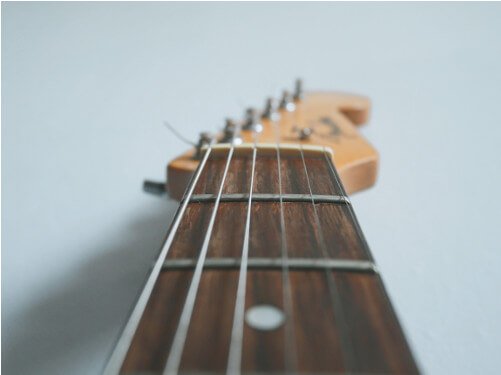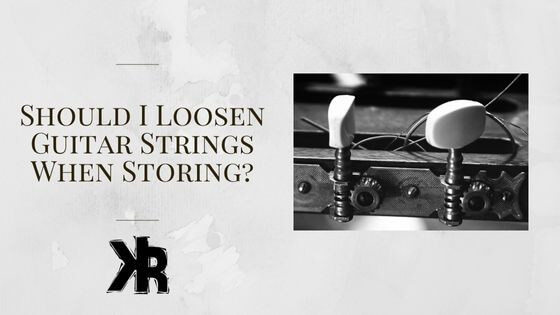Table of Contents
One common question newer players have is, should I loosen my guitar strings when not playing?
No, It’s safe to leave your guitar strings in tune and tight when not playing them. Your guitar is designed to handle the tension. The strings will also last longer, as loosening them after each session can wear them faster.
There are pros and cons to both keeping your strings tight and loosening them. The type of guitar, as well as the length of time it will sit idle, also have to be considered.
In this Killer Rig article, we will look at the best practices when it comes to loosening your strings when not playing.
Should I Loosen My Guitar Strings?
The majority of guitarists leave their strings in tune and don’t loosen them when not playing.
If you are the type of player that practices multiple times a week, there is no need to loosen them. Your guitar is designed to handle the tension from the strings for a very long period.
Leaving them taut also prevents wear to your strings and guitar parts. Every time you loosen and tighten, it stresses them. Your strings make contact with other parts and this can create friction. There is a better chance that they will break sooner because of this.
Your nut and machine heads will also wear out sooner if you loosen and tighten often. So it’s best to leave them in tune, even if you only play once per week.
Guitar Brand
Another thing to consider is the brand of the guitar and its build quality. Some cheaper models are made with laminated plywood.
While more expensive ones are solid. A guitar made from laminated sheets will be affected by humidity far greater than a solid piece of wood.
If your guitar strings are loose, your instrument may begin to shift. This can be due to dryness and forces like gravity.
This can make a guitar neck bow in the opposite direction and is common with laminates. When you do go to play it again, the neck will need time to deal with the tension.
If you leave the strings tight, they will keep the neck straight and properly aligned. The truss rod inside your neck is designed to handle this force, which is healthy for your instrument. So if you have a lower-quality guitar, it’s best to leave your strings tight.
Loosen Guitar Strings For Long Term Storage?
When it comes to storing guitars for a long period, there are some things that you should keep in mind. Humidity levels are one of the biggest storage issues. If not optimal, an instrument can be damaged to a point of being unfixable.
So when storing a guitar of any kind, you want to look into this first. The type of guitar being stored will need different levels of preparation. An electric guitar doesn’t require the same things an acoustic does.
Electric Guitar Storage
When storing an electric guitar, the strings don’t need to be loosened in most cases, even for the long term. A solid-body electric guitar is built very rigidly and is not affected by the tension of strings.
The bridge is normally bolted to the body in some form, and the truss rod can deal with the string tension. As long as the humidity levels are optimal. An electric guitar can be stored with tight strings with no issues.
If you do feel like you need to relieve tension on the strings, however, it’s also safe to loosen them halfway. There is no need to take them off completely.
Acoustic Guitar Storage
An acoustic guitar is different when it comes to storage. Humidity is again one of the most important things to consider, this will never change.
But the string tension on an acoustic guitar can begin to do damage to the body over time if stored incorrectly.
If you are storing an acoustic for a long period, you will want to loosen the strings a half step or so. This will help prevent one of a few possible things:
- Acoustic Bridge lifting
- Excessive belly bulge
- Neck reset
A majority of these things will happen over time. Storing the guitar with strings at half of their normal tightness will help prevent them.

Classical Guitar Storage
Classical guitars with nylon strings don’t have the same tension as steel. As a result, some of them don’t even have a truss rod in the neck. If they do, it’s simply carbon fiber reinforcement rods to offset some force.
In this case, loosening a classical or flamenco guitar’s strings is recommended. At least when inactive for a long period.
If the nylon strings are left tuned, the neck could bow forward and remain like this permanently. This can happen with changing temperatures and poor humidity conditions.
Long-Term Storage Tips
There are some things that you can do to give your guitar the best storage conditions when it will not be used.
- Store them in a hard shell case
- Use a guitar humidifier system
- Store in a cool environment
Storing your guitar in a hard shell case is important because it is less likely to be damaged. If something should ever be accidentally dropped on the case, it won’t hurt the guitar. Whereas a soft case might let the finish or body be damaged.
Using a hard shell case and a guitar humidity system will also lock in the right amount of moisture.
This is a great way to preserve the wood. This is the optimal condition for any guitar to prevent damage from long-term storage.
You also want to make sure that the temperature is on the cooler side, as any adhesives will remain strong. Warmer temperatures could weaken the glue used in some guitars. This would compromise the integrity.
FAQs
When should you loosen guitar strings?
It’s best to loosen your strings when you are not playing the instrument and won’t be for the long term.
This will help prevent any unnecessary force from causing damage. But is only required with certain guitar types. Some guitars will not need to have them loosened for storage and will do better with taut strings.
Should I detune my guitar after playing?
No, loosening the strings after playing is not necessary. Guitars are made to be able to handle tension. Relieving the string tension can have the opposite effect and potentially cause damage.
Also, loosening after each play session will only lead to more broken strings. Or worn-out parts earlier than expected. It’s not necessary to constantly reduce the tension, even if you only play once per week.

